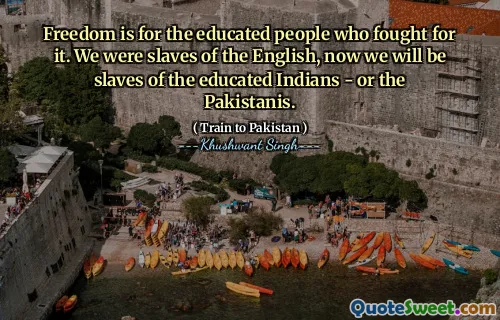"Train to Pakistan" is a poignant novel by Khushwant Singh that explores the impact of the Partition of India in 1947. Set in the fictional village of Mano Majra, the story revolves around the lives of its inhabitants, who are caught in the turmoil of communal violence. The tranquility of their lives is shattered as the political upheaval forces them to confront deep-seated biases and the brutal consequences of division between Hindus and Muslims.
At the heart of the narrative is the arrival of a train filled with corpses, symbolizing the violence that has erupted. The village experiences fear and suspicion as tensions rise, bringing out the worst in people. Characters like Juggut Singh, a dacoit, and Iqbal, a political activist, navigate the complexities of loyalty, love, and sacrifice amidst the chaos, illustrating diverse human experiences against the backdrop of historical events.
The novel is not just about the horrors of Partition; it also highlights the resilience of the human spirit. Through its vivid portrayal of people facing unprecedented challenges, Singh emphasizes themes of humanity, compassion, and the possibility of redemption. "Train to Pakistan" serves as a powerful reminder of the tragedies of communal conflict, urging readers to reflect on the importance of tolerance and understanding in a diverse society.
More »
Today Birthdays
1729 -
Edmund Burke
1949 -
Haruki Murakami
1954 -
Howard Stern
1876 -
Jack London
1993 -
Zayn Malik
1951 -
Kirstie Alley
1863 -
Swami Vivekananda
1923 -
Alice Miller
1987 -
Naya Rivera
1825 -
Brooke Foss Westcott
1944 -
Joe Frazier
1951 -
Rush Limbaugh
1964 -
Jeff Bezos
1978 -
Jeremy Camp
1628 -
Charles Perrault
1856 -
John Singer Sargent
1970 -
Kaja Foglio
1953 -
Rick Santelli
1986 -
Gemma Arterton
1968 -
Raf Simons
1958 -
Christiane Amanpour
1966 -
Olivier Martinez
1996 -
Ella Henderson
1917 -
Maharishi Mahesh Yogi
1949 -
Ottmar Hitzfeld
1928 -
Ruth Brown
1968 -
Heather Mills
1946 -
George Duke
1968 -
Rachael Harris
1923 -
Ira Hayes
